Tuesday, August 01, 2006
Canadian English -- seeing the signs
[more residual travel blogging]
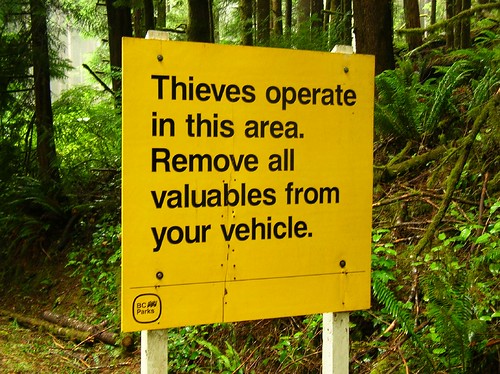
It must be both a blessing and a curse to be Canada, living obscurely in the giant shadow cast by the USA. The blessings are those of peaceful, quiet, sensible existence, except of course when it comes to ice hockey. The curse is the annoyance of having your culture overlooked.
Brits and Americans love to compare notes on the differences between "English" and "American English," and will even stop to make fun of Australian accents or hire Crocodile Dundee to advertize a sports utility vehicle. But whoever talks about "Canadian English."
Yet not only do Canadians speak fluent English -- I can attest personally to that -- but they also have such cute little ways with their version of our language. What I find particularly charming about Canadian English is their not-quite-Britishisms -- as if they were trying to remind everyone that they never rebelled and exited the British Commonwealth.
Take the warning sign, at the top of this post. In the US, the equivalent warning would say: "Warning: Do Not Leave Valuables in Your Car." It's a blunt message of fear. But the Canadian message suggests an enlighted culture that acknowledges that thieves are people too -- people who, indeed, apply some skill in their craft. They don't just steal your stuff -- they "operate."
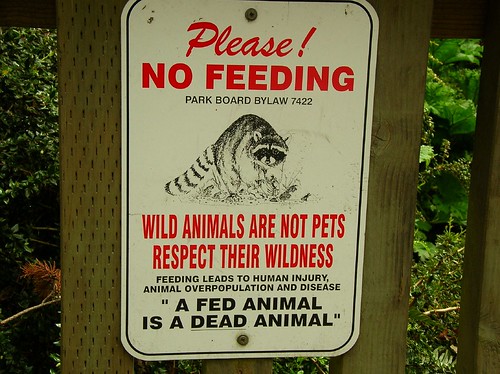
The Canadian version of "Please Do Not Feed Wildlife" is noteworthy for its effort to reach people with a diversity of communicative styles. We get the curt general admonition, and a nice jingle at the end, with an explanation for people who need to be convinced with reasons. And I love the thought of such a restrained, polite people as the Canadians respecting "wildness" in others.
This next sign, I must admit, confuses me:
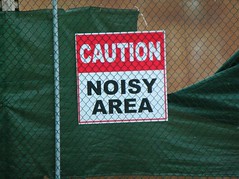
This was posted on the fence of a large construction excavation. Deceptively simple, no? When I was there in the evening, it was very quiet.
I've already discussed this one. I guess Canadians are just as intent as Americans on avoiding inappropriate behaviors:
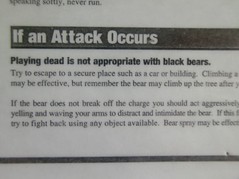
This next sign, at the entrance to the Vancouver Aquarium, continues with the animal protection theme. Yet it seems to signal more subtle things about Canadians than about the animals they wish to protect.
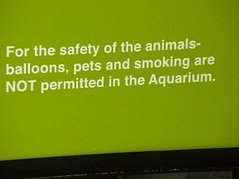
Like the Brits, Canadians have a penchant for names that exist in the U.S. only in anglophile children's literature:
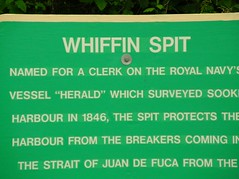
The Canadians are an unpretentious people. So much so, that on that rare occasion when they try to be pretentious, they can't quite pull it off. This next item is from the inside cover of a menu of a 5-star restaurant at an inn on Vancouver Island.
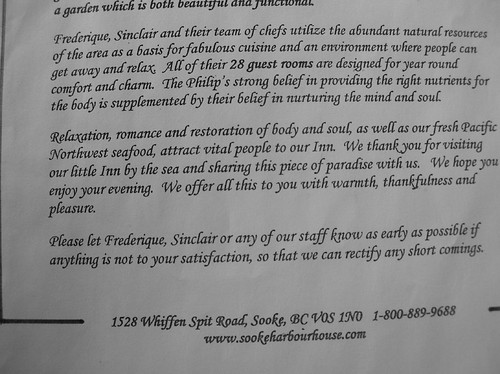
The first thing I'd like you to rectify, sir, is to make "shortcoming" one word.
Canadians' relationship to visual images is also subtly different from our own. These next images would appear in the United States on the cover of a cheap romance novel or a home pregnancy test kit:
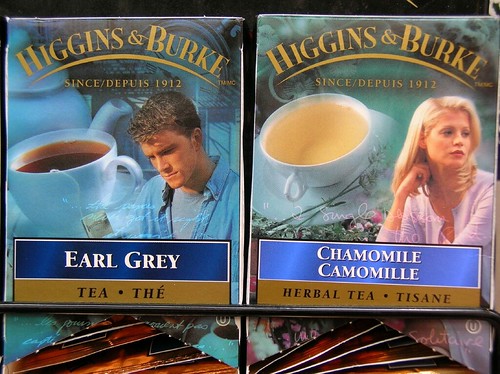
But something about them makes Canadians want to drink tea.
Don't get me started with the road signs. What would you do if you were driving and you suddenly saw this?
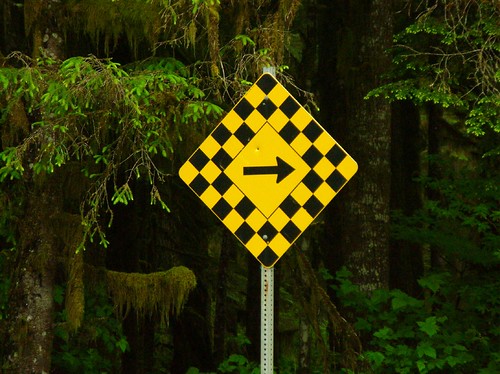

It must be both a blessing and a curse to be Canada, living obscurely in the giant shadow cast by the USA. The blessings are those of peaceful, quiet, sensible existence, except of course when it comes to ice hockey. The curse is the annoyance of having your culture overlooked.
Brits and Americans love to compare notes on the differences between "English" and "American English," and will even stop to make fun of Australian accents or hire Crocodile Dundee to advertize a sports utility vehicle. But whoever talks about "Canadian English."
Yet not only do Canadians speak fluent English -- I can attest personally to that -- but they also have such cute little ways with their version of our language. What I find particularly charming about Canadian English is their not-quite-Britishisms -- as if they were trying to remind everyone that they never rebelled and exited the British Commonwealth.
Take the warning sign, at the top of this post. In the US, the equivalent warning would say: "Warning: Do Not Leave Valuables in Your Car." It's a blunt message of fear. But the Canadian message suggests an enlighted culture that acknowledges that thieves are people too -- people who, indeed, apply some skill in their craft. They don't just steal your stuff -- they "operate."

The Canadian version of "Please Do Not Feed Wildlife" is noteworthy for its effort to reach people with a diversity of communicative styles. We get the curt general admonition, and a nice jingle at the end, with an explanation for people who need to be convinced with reasons. And I love the thought of such a restrained, polite people as the Canadians respecting "wildness" in others.
This next sign, I must admit, confuses me:

This was posted on the fence of a large construction excavation. Deceptively simple, no? When I was there in the evening, it was very quiet.
I've already discussed this one. I guess Canadians are just as intent as Americans on avoiding inappropriate behaviors:

This next sign, at the entrance to the Vancouver Aquarium, continues with the animal protection theme. Yet it seems to signal more subtle things about Canadians than about the animals they wish to protect.

Like the Brits, Canadians have a penchant for names that exist in the U.S. only in anglophile children's literature:

The Canadians are an unpretentious people. So much so, that on that rare occasion when they try to be pretentious, they can't quite pull it off. This next item is from the inside cover of a menu of a 5-star restaurant at an inn on Vancouver Island.

The first thing I'd like you to rectify, sir, is to make "shortcoming" one word.
Canadians' relationship to visual images is also subtly different from our own. These next images would appear in the United States on the cover of a cheap romance novel or a home pregnancy test kit:

But something about them makes Canadians want to drink tea.
Don't get me started with the road signs. What would you do if you were driving and you suddenly saw this?

Comments:
<< Home
I offer another definition for Neel's verifictionary word:
kyqhf (Ky-quiff): It's the perfect (and stylish) haircut for humid Kentucky summers--super short in the back, longer in the front.
Post a Comment
kyqhf (Ky-quiff): It's the perfect (and stylish) haircut for humid Kentucky summers--super short in the back, longer in the front.
Subscribe to Post Comments [Atom]
<< Home
Subscribe to Comments [Atom]

